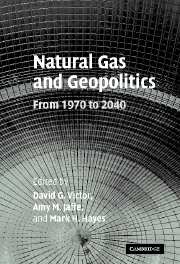Book contents
- Frontmatter
- Contents
- List of figures
- List of tables
- List of boxes
- List of contributors
- Foreword by James A. Baker, III
- Acknowledgments
- List of acronyms and abbreviations
- Part I Introduction and context
- Part II Historical case studies
- 2 Introduction to the historical case studies: research questions, methods and case selection
- 3 The Transmed and Maghreb projects: gas to Europe from North Africa
- 4 Liquefied natural gas from Indonesia: the Arun project
- 5 Bypassing Ukraine: exporting Russian gas to Poland and Germany
- 6 Natural gas pipelines in the Southern Cone
- 7 International gas trade in Central Asia: Turkmenistan, Iran, Russia, and Afghanistan
- 8 Liquefied natural gas from Qatar: the Qatargas project
- 9 Liquefied natural gas from Trinidad & Tobago: the Atlantic LNG project
- 10 Politics, markets, and the shift to gas: insights from the seven historical case studies
- Part III International gas trade economics
- Part IV Implications
- Appendix: Technical notes
- Index
- References
9 - Liquefied natural gas from Trinidad & Tobago: the Atlantic LNG project
Published online by Cambridge University Press: 22 September 2009
- Frontmatter
- Contents
- List of figures
- List of tables
- List of boxes
- List of contributors
- Foreword by James A. Baker, III
- Acknowledgments
- List of acronyms and abbreviations
- Part I Introduction and context
- Part II Historical case studies
- 2 Introduction to the historical case studies: research questions, methods and case selection
- 3 The Transmed and Maghreb projects: gas to Europe from North Africa
- 4 Liquefied natural gas from Indonesia: the Arun project
- 5 Bypassing Ukraine: exporting Russian gas to Poland and Germany
- 6 Natural gas pipelines in the Southern Cone
- 7 International gas trade in Central Asia: Turkmenistan, Iran, Russia, and Afghanistan
- 8 Liquefied natural gas from Qatar: the Qatargas project
- 9 Liquefied natural gas from Trinidad & Tobago: the Atlantic LNG project
- 10 Politics, markets, and the shift to gas: insights from the seven historical case studies
- Part III International gas trade economics
- Part IV Implications
- Appendix: Technical notes
- Index
- References
Summary
Introduction
In 1992 Cabot LNG, a relatively small Boston-based LNG importer and owner of the Everett LNG receiving terminal just north of Boston, approached the government of Trinidad & Tobago about developing a new LNG export project. Although three attempts had been made previously to develop LNG in Trinidad & Tobago, nothing had come of them and the government had largely concentrated on attracting intensive gas-based industries to the country. The industries had come but had not greatly prospered. Cabot's approach came soon after the government had decided to liberalize its economic policy; new sources of revenue were badly needed. Amoco and British Gas (BG) (both with significant gas prospects in Trinidad & Tobago) signed a memorandum of understanding (MOU) with Cabot, and the Trinidad & Tobago National Gas Company (NGC) to promote an LNG export project (Gas Matters 1993b). The group launched a feasibility study in 1993. Atlantic LNG, the JV company eventually set up to own and run the project, was formed in 1995. Cabot and Enagas of Spain pledged to purchase a total of 3 mtpa of LNG. Construction started in 1996. The first cargo (train 1), bound for Boston, was loaded at the end of April 1999. Design work and sales negotiations for a two-train expansion with a further 6.8 mtpa capacity (trains 2 and 3) were started in early 1999 and construction started in 2000. Train 2 started up in August 2002 and train 3 in May 2003.
- Type
- Chapter
- Information
- Natural Gas and GeopoliticsFrom 1970 to 2040, pp. 268 - 318Publisher: Cambridge University PressPrint publication year: 2006
References
- 4
- Cited by



